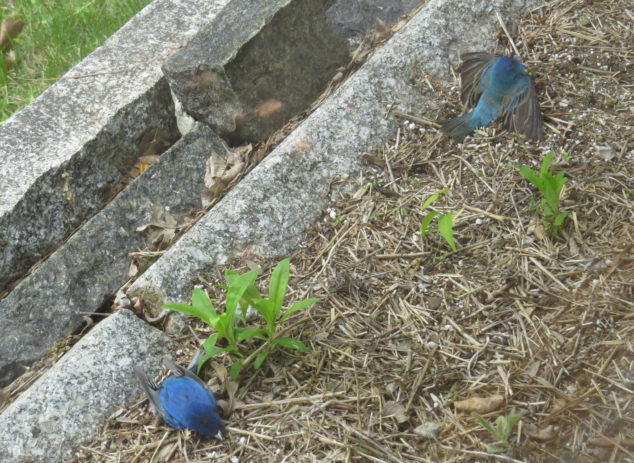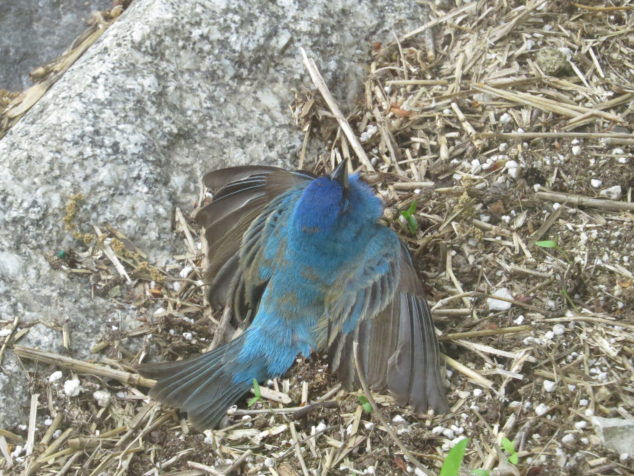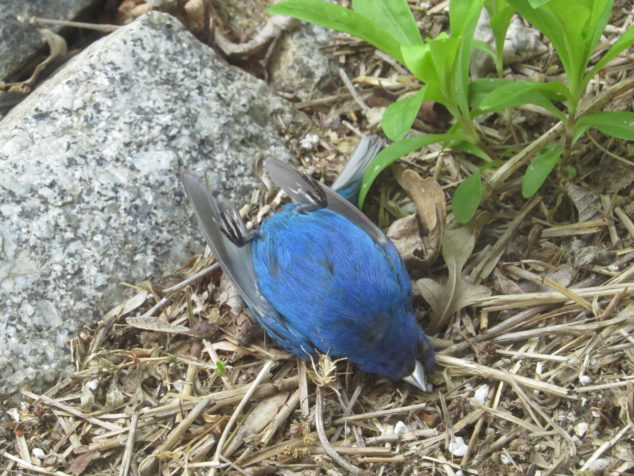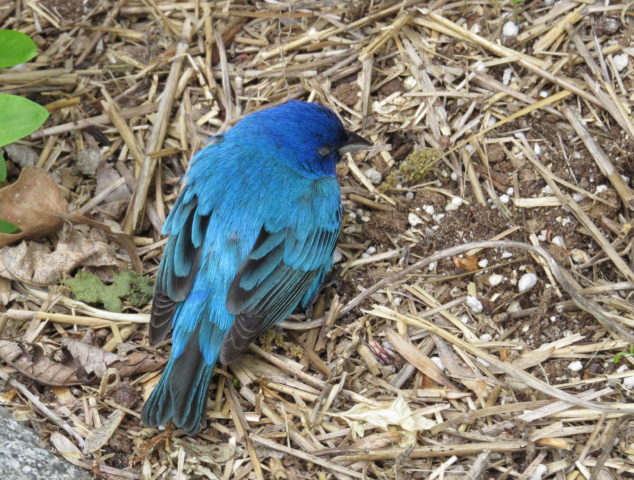Those things that make our lives easier and better and yeah, we end up taking them for granted—electricity, hot running water, grocery store food, heat, ac, internet, working computers. This last month has been a little bumpy on the computer front with failing hard-drives, changing hard-drives, failing to get that to work, a seriously messed-up old laptop, and then a frozen NorthStarNature Facebook page—as in the cover photo would load, but I couldn’t scroll down or do anything. It was stuck, frozen, unable to move or do what it was supposed to do.
Chris and I were sitting at the table in late May when we heard a characteristic thump on the living room window, although this time it was a double thump. We knew what that meant—another bird, or in this case, two, had hit the window. We went to see if they had survived the reflecting encounter.
Stunned. Shocked. Dead?
When I went outside a few minutes later to see if they could be revived, the upright one flew away. Good. I turned the other one over to get his feet under him and gently stroked his exquisite blue feathers. His eyes were still closed, his little bird body was quiet except for an occasional quiver, and I could see that it was taking all his energy, his internal wherewithal, to regain his senses. These things take time. He eventually flew a little ways and needed more time for re-orienting. I knew he would be okay.
Indigo Buntings are amazing little birds; not only are the males beautiful in their brilliant blue coats, they also migrate at night using the stars for guidance! What!? (They researched that using captive Buntings in a planetarium and under a natural sky.) Breeding males often get into fights locking feet with one another and falling to the ground. They also defend their territory by approaching the other with slow butterfly-like display flight. Perhaps one of these behaviors contributed to their tandem window slam.
My frozen Facebook page was resolved in the last couple of days by the brilliant computer skills of some unknown FB technician after numerous communications with me and them—words to let them know there was a problem, questions from them about the details of what was happening on my end, answers to those questions to the best of my no-computer-skills ability, problem-solving work on their end, patience on mine. The frozen Indigo Buntings, the heart-beating, food-finding, mate-seeking animals that suffered a collision, were in shock. Their bodies shut down from the trauma. The one who flew away could have been younger or stronger, more able to withstand and bounce back from the impact. The other may have been flying faster, may have suffered previous traumas or head injuries, or in some way been more sensitive to the traumatic impact on his body—more time, more compassionate help, more tries were needed to regain his orientation and his place in the world. And then, there is us. Humans, like other animals, are physiologically programmed to respond to threats, danger, and trauma with flight, fight, and/or freeze, depending on the situation. It happens without us thinking about it or making a cognitive decision. Our bodies automatically respond by shutting down digestion, increasing heart rate, increasing blood flow to the muscles, sending out adrenaline and other hormones in order to get us ready for running away or fighting. But if neither of those choices are possible, or if extreme physical or emotional trauma occurs, we freeze. Other physiological signals are sent out, and our bodies and parts of our brain shut down, and we are unable to move or do what we’re supposed to do. We are stunned, shocked, feeling like we are going to die. Some of you may know what I’m talking about. This is when it is imperative to have brilliant, compassionate helpers, when time takes on a different dimension and purpose, when everything we take for granted is tossed up in the air and we have no idea what will land in our possession again. Our interior world becomes the most important thing, as the external world turns dark and fades away…. We look to the stars for guidance, we follow our own North Star, we breathe, we quiver, we heal. It takes time, it takes internal wherewithal, courage, and Love, and it takes a community of help-ers, pray-ers, and love-ers in order for us to fly again.



